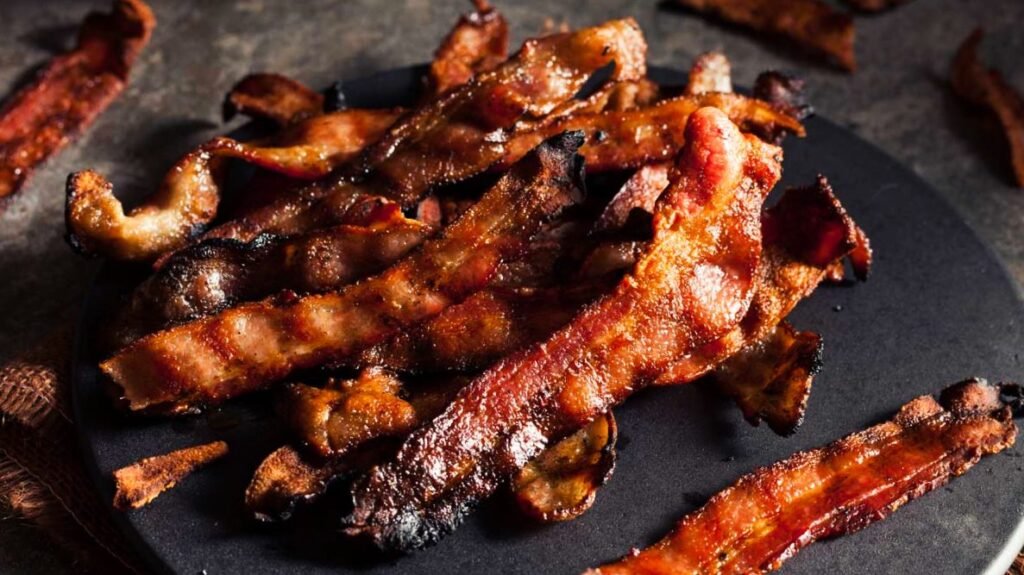Bacon is a beloved food for many, known for its savory flavor and crispy texture. It’s not uncommon for cat owners to wonder, can cats eat bacon? As a cat owner, it’s natural to want to share your food with your pet, but some human foods can be harmful to cats.
Bacon, in particular, is a popular breakfast food that can be dangerous to cats due to its high fat and salt content, as well as the presence of preservatives and additives.
In this article, we’ll explore why cats can’t eat bacon and what healthy alternatives you can offer your feline friend instead.
Can Cats Eat Bacon?
Cats should not eat bacon, despite its tempting smell and taste. While an occasional small piece may not harm your cat, regular bacon consumption can lead to serious health issues. Bacon is high in fat and sodium, which can cause obesity, diabetes, and liver disease in cats.
Additionally, the seasonings and additives in bacon can lead to methemoglobinemia and hemolytic anemia, both of which are life-threatening conditions. Raw bacon also contains harmful bacteria like Salmonella and E. coli, which can cause cat illness. Overall, bacon is not a healthy or safe treat for cats, and it’s best to stick to nutrient-rich, cat-specific foods and treats.

Is Bacon Safe for Cats?
Bacon is not inherently toxic to cats, but it is far from a healthy choice. There are several reasons why bacon should be given sparingly, if at all:
1. High Fat Content
Bacon is rich in fats, which can lead to obesity and related health problems in cats. Cats have a lower tolerance for high-fat foods compared to humans.
2. High Salt Content
The high sodium levels in bacon can be harmful to cats. Excessive salt intake can lead to sodium ion poisoning, causing symptoms like vomiting, diarrhea, seizures, and even death in severe cases.
3. Preservatives and Additives
Bacon often contains preservatives and additives, such as nitrates and nitrites, which can be harmful to cats.
4. Pancreatitis Risk
The high-fat content in bacon can also increase the risk of pancreatitis, a potentially life-threatening inflammation of the pancreas.
What to Feed Your Cat Instead
Bacon is a favorite food for many people, and cats often find it appealing as well. However, if you’re looking to treat your cat with some delicious snacks, there are far better choices than bacon.
Instead of bacon, consider these healthy and safe alternatives:
- Cooked chicken or turkey
- Cooked fish
- Boiled eggs
- Plain yogurt
- Cat treats(made from natural ingredients)
Symptoms of Bacon Overconsumption in Cats
If you’re still considering, can cats eat bacon? it’s essential to recognize the symptoms of bacon overconsumption. If a cat consumes too much bacon, they may exhibit symptoms such as:
- Vomiting and Diarrhea
- Lethargy
- Increased Thirst and Urination
- Seizures
How to keep your cat away from bacon
While it may be tempting to share your bacon with your feline friend, it’s important to remember that bacon is harmful to cats. To keep your cat safe and healthy, it’s crucial to take steps to prevent them from getting their paws on bacon.
Here are some tips to prevent your cat from eating bacon:
1. Keep bacon out of reach
Store bacon in a secure location, such as a high cabinet or a closed container.
2. Don’t leave bacon unattended
Keep an eye on bacon while it’s cooking or sitting out.
3. Keep your cat occupied
Engage your cat in play or provide puzzle toys filled with treats to distract them from bacon.
4. Provide alternative treats
Offer your cat healthy treats, such as catnip or treats made from natural ingredients.
How much can cats eat Bacon ?
Feeding your cat bacon is not recommended, as it can be harmful to their health. However, if your cat has already ingested bacon, the amount that can be harmful depends on various factors, including the amount consumed, your cat’s size and weight, and the fat content of the bacon.
While small amounts may not cause severe symptoms, moderate amounts can lead to vomiting, diarrhea, and lethargy. Large amounts can cause severe health complications, including pancreatitis, and require immediate veterinary attention.
It’s essential to monitor your cat’s behavior and health closely if they’ve ingested bacon and seek professional advice if you’re concerned. To keep your cat safe, it’s best to avoid feeding them bacon altogether and opt for nutritious, cat-specific food instead.
Is Turkey and Canadian Bacon Safe for Cats?
Neither turkey nor Canadian bacon is considered safe for cats in large quantities or regularly. While small amounts of cooked, plain turkey without bones or seasoning might be okay as an occasional treat, it should not be a staple in a cat’s diet.
Canadian bacon, being a slice of processed meat, is not recommended for cats due to its high salt content and potential additives that could be harmful to them.
Cats have specific dietary requirements that are best met with a balanced cat food formulated to meet their nutritional needs. If you want to treat your cat, it’s safer to choose specially formulated cat treats or approved human foods in very small amounts and only occasionally.
Always consult with your veterinarian if you have concerns about what foods are safe for your cat to consume.
Learn More About: Cats eating onions?
Conclusion
The question, can cats eat bacon? is common among pet owners, but the risks associated with bacon make it an unsuitable treat. High in fat, salt, and potentially harmful additives, bacon can pose several health risks if given regularly or in large quantities.
Opt for healthier treats and ensure that any human food you share with your cat is safe and beneficial for their well-being. Always prioritize your cat’s health and consult your veterinarian if you have any concerns about their diet.
